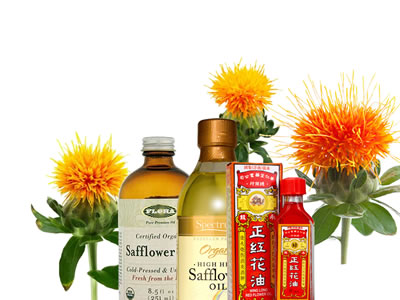Safflower Oil can be used for treating heart disease, relieve menstrual cramps, joint pain and treat injuries.
Safflower (Carthamus tinctorius L.) is a plant about 100 cm in tall with red or yellow flowers. Safflower is a crop that is commercially cultivated for vegetable oil and medicine. Safflower oil is extracted from the seeds.
Safflowers were found in the tomb of the pharaoh Tutankhamun in ancient Egypt. For thousands of years, safflower seed oil is used as a vegetable oil for cooking and as a medicine for relieving pains. The flower is also used to color cosmetics and dye fabrics.
Safflower oil is similar to sunflower oil. It is flavorless and colorless. Safflower oil can be used as a cooking oil.
Medicinal uses and benefits of safflower oil
Safflower oil can be used for preventing and treating heart disease. Safflower oil contains linolenic and linoleic acids, which help prevent atherosclerosis (hardening of the arteries) and stroke, lower cholesterol, and reduce the risk of heart disease. The compounds in safflower has blood-thinning properties that help prevent blood clots, lower blood pressure, and promote the blood flow. Some researchers believe that taking safflower oil as a dietary supplement may have effects to lower total and “bad” low-density lipoprotein (LDL) cholesterol.
With the blood moving and thinning properties, safflower oil is also beneficial to women who suffer from painful menstrual periods. It can relieve the pain by promoting the blood flow and removing clots.
In traditional Chinese medicine, safflower is an important medicine. It is a paint solvent and blood-mover used for treating bruises, arthritic aches, traumatic injuries and joint pains. The flower is usually combined with other herbs, such as frankincense and myrrh, to make a decoction for internal use. And the oil is used as massage oil rubbed on the affected area for relieving pains. Safflower oil is a household medicine in China. It can be found in almost every home. People use it for joint pain, muscle pain and injuries. The oil has effects to promote blood circulation, remove clots, and relieve pains.
How to use safflower oil
Basically, there are two types of safflower oil in the market. One is used for cooking or for internal medicinal use. Another one is for external medicinal use. You should check the labels on the products, and read the instructions. If the label says that the oil is used as massage oil for joint pain and injuries, then this oil is for external use. You should not take it by mouth. If the label says that the oil is used for cooking, then this oil can be used internally. You can eat it with foods or use it as an internal medicine. Please note, the edible oil can be used externally, but an oil only made for massage should not be taken by mouth.
Safflower oil is a vegetable oil. You can use it for cooking in the same way like using olive oil or sunflower oil. You can add it to salads and dishes. If you have heart disease, atherosclerosis or high cholesterol, you can often use safflower oil for cooking. It will help lower the risk of heart disease and stroke.
Women who often suffer from menstrual pains can include safflower oil in their daily diet. Consuming it for several days once a month before the periods start.
Safflower oil can also be used as a health supplement. The recommended dose is 1-2 teaspoons per day for 3-4 months for improving heart and cardiovascular health. For treating painful menstruation, the oil can be taken for a few days before the period, and stop using it after menstruation starts.
To treat bruises, arthritic aches, traumatic injuries, joint pains and muscle pains, you can take safflower decoction or safflower oil by mouth. And you can also use safflower oil for massage. Just rub a few drops of the oil onto the affected area, gently massage for a few minutes. This will relieve the pains and reducing bruising.
Warnings and precautions
Please note, safflower has blood-thinning and blood-moving properties. People with bleeding problems should avoid it. Safflower could increase the risk of bleeding. Women in pregnancy should not use it because it may cause abortion. People who have low blood pressure should not use safflower as it may lead to a drop in blood pressure. And people who are allergic to daisy should use it with precautions because it may cause an allergic reaction.
Safflower has no blood nourishing properties. It just promotes blood circulation, thus it has drying properties. If you have blood deficiency, you should not use it internally for a long term as it may drys your blood up.
It is strongly recommended that you consult your doctor or holistic health professional before using safflower oil for a treatment, especially for using it internally. You should speak to your doctor about potential benefits and risks before using any remedies.
References
- Domestication of plants in the Old World, 3rd Edition, Daniel Zohary and Maria Hopf, Oxford: University Press, 2000, p. 211
- Traditional Chinese Medicine, Lei Zaiquan, Chen Songyu, and Gao Xuemin, 1995, Shanghai Science and Technology Press pp. 206 ISBN 7-5323-3706-5.



